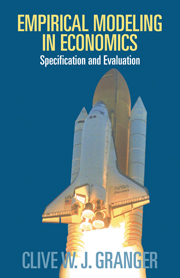2 - The evaluation of empirical models
Published online by Cambridge University Press: 22 September 2009
Summary
General comments
How do I know if an economic theory or an empirical model is any good? This is an important question that is asked insufficiently often in published reports and papers. Anyone can write down a piece of theory or present an empirical model and propose that it be used, but how do we know that the model or theory has any worthwhile content? This is the type of question that I will explore in this chapter.
When the word “evaluate” was introduced in the mid nineteenth century, according to the Concise Oxford English Dictionary it meant to put a numerical value on to something. However, the quotation that the dictionary used to illustrate the word was from the famous biologist J.S. Huxley, “to read all previous work on the subject, in order evaluate one's own results correctly.” Now the word is being used in a subjective rather than a quantitative way. Frequently evaluations will involve a comparison between alternatives, and possibly even a ranking, but this does not necessarily involve strict cardinal measurements.
It is worthwhile starting out by considering evaluation in a general context. Society at large appears to have a mixed attitude toward evaluation; some sections seem to use it a great deal, other parts quite rarely, at least publically.
Doctors and dentists evaluate patients, engineers evaluate bridges, and teachers evaluate students.
- Type
- Chapter
- Information
- Empirical Modeling in EconomicsSpecification and Evaluation, pp. 33 - 60Publisher: Cambridge University PressPrint publication year: 1999

